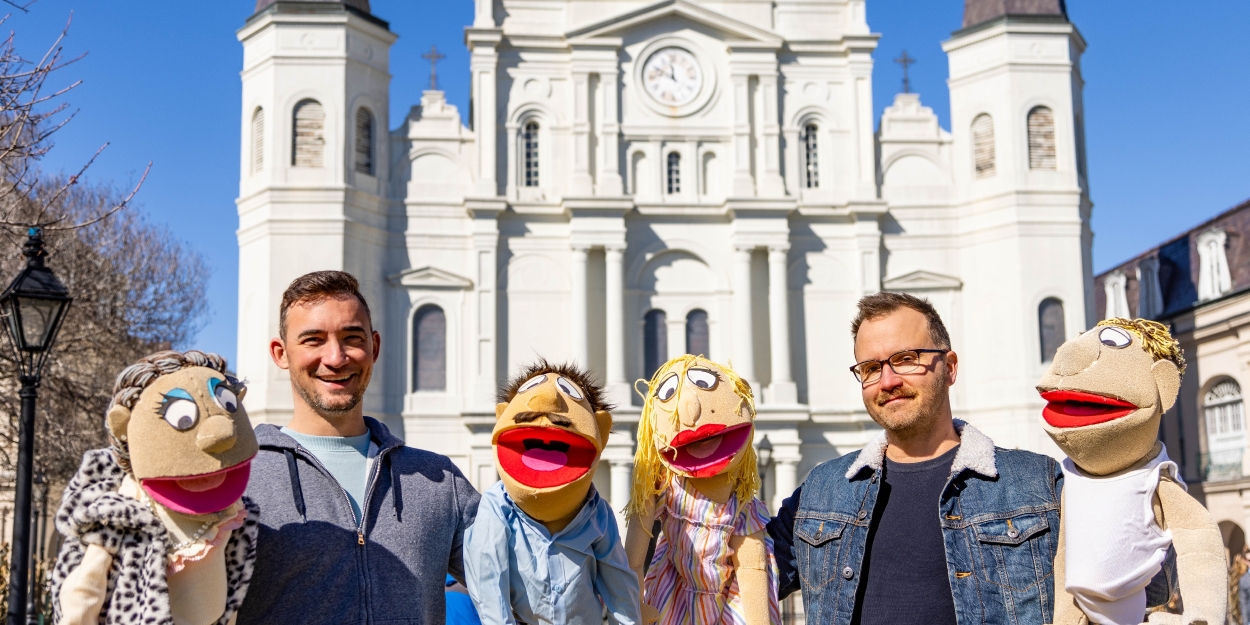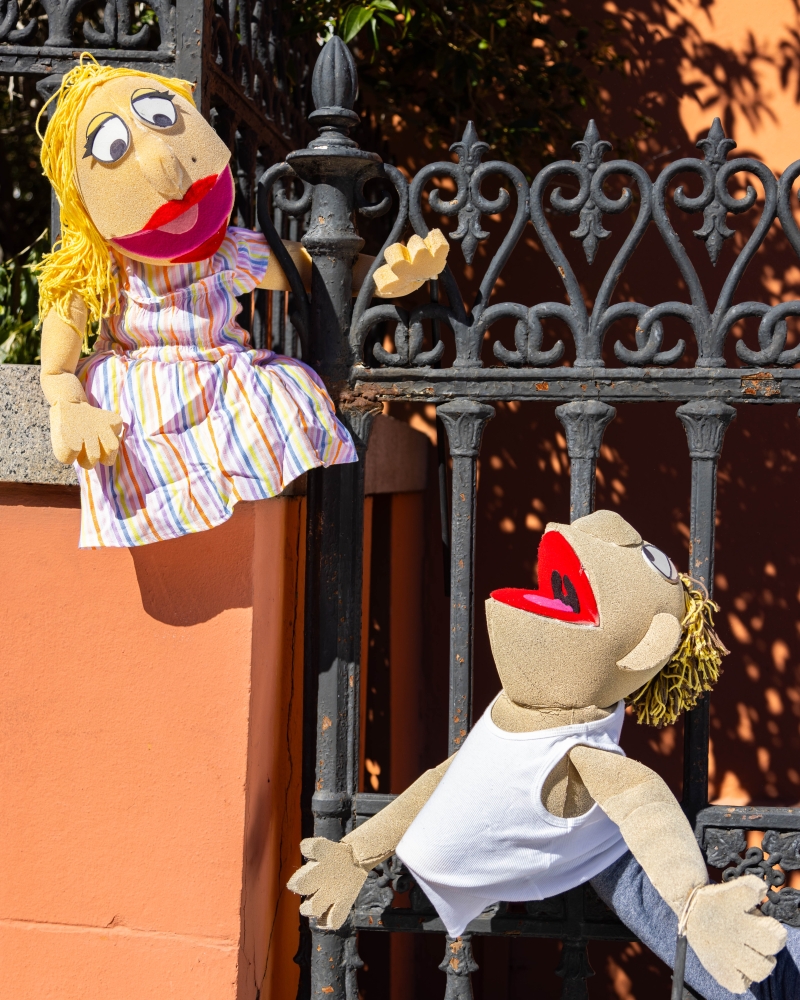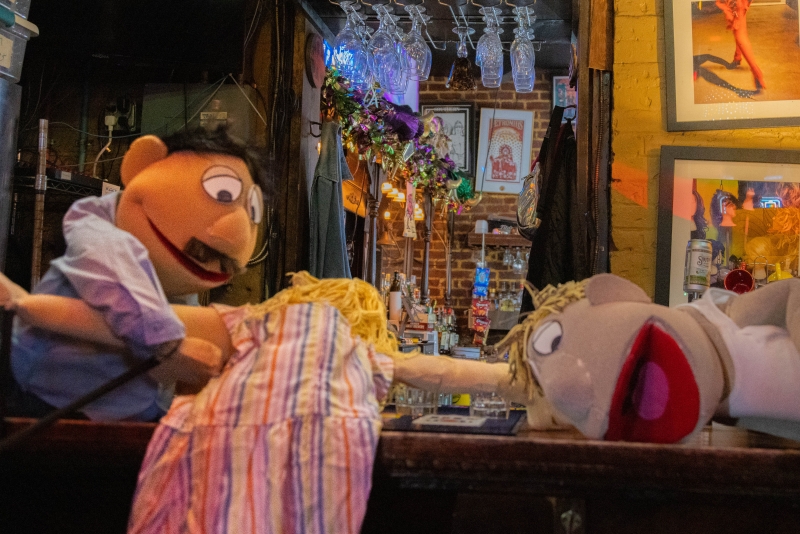Interview: Tennessee Williams Classics Get A FELT Makeover
THE FELT MENAGERIE runs for 3 weekends in New Orleans


In an innovative twist on Tennessee Williams, the Tennessee Williams Theatre Company presents a unique creation perfect for anyone who knows how to get to Sesame Street. THE FELT MENAGERIE, a puppet-based play inspired by Williams’ most celebrated works opens this week, and runs for three weekends in three different locales, including the Zeitgeist Theatre, UNO and the New Marigny Theatre at the Church of Arts & Sciences. Amid the social distancing challenges of 2020, TWTC sought a creative outlet that bypassed the fatigue of ubiquitous Zoom theatre productions. The result was a vibrant puppet show that merges the emotional depth of Williams’ narratives with the whimsical potential of puppetry. First introduced virtually, THE FELT MENAGERIE is now set to charm audiences live beginning May 10. BroadwayWorld.com sat down with TWTC Co-Artistic Director and FELT MENAGERIE creator Augustin Correro to discuss the journey from the digital to physical stage and how classic southern drama can find new life and laughter through the unexpected medium of puppets.
Can you share what inspired you to create THE FELT MENAGERIE?
Correro: It was 2020, toward the end of the year, and of course, we were all still doing our pandemic distancing thing, and theatre was tough at the time. We had done a few online readings, and we were one of the first companies in New Orleans to do that, but after a couple of months, I think we were all pretty fatigued with the online reading, online play via Zoom thing, and it was just missing something. That’s when we were approached by Tennessee Williams at the New Orleans Literary Festival. They said, “Hey, we’re going to have an online festival next year; we want y’all to be involved.” But of course, what can we do that’s Tennessee Williams? [While] also socially distance safely and completely online. And the first thing I didn’t want to do was another Zoom reading. And because of that fatigue, I had to ask myself, “Well, what can we do that’s going to be fun and safe?” And so, I said, “What hasn’t been done on Zoom, or what hasn’t been transmitted online just yet?” And you know what we haven’t seen was puppets on Zoom.
So, we went to work on this idea of a Tennessee Williams-style puppet play. I was very much inspired by Christopher Durang, and we had in our season before the shutdown planned to do FOR WHOM THE SOUTHERN BELL TOLLS, which was our return to the stage show we did in 2022. But I was still living in that Christopher Durang fantasy, and it camped on so many of Williams’ plays. So, I took inspiration from that, and of course, I took inspiration from all the puppet theatre that I’ve enjoyed, and puppet shows like Sesame Street, which I’ve enjoyed my entire life. And so, we decided to make this zany, Tennessee Williams-style comedy, and to keep it short, we were like, “Let’s use these puppets to condense the action and the drama of the play.” Because when you have real live actors, it takes an entire play to develop the characters and to earn the heights of emotional drama, but when you have puppets, once you’ve got the audience with you with the puppets, you can go from 0 to 60 very quickly.
So, 2021 was the streaming premiere, but this will be the first live premiere.
Correro: Right. Even the streaming premiere was just that. It was pre-recorded, it was made to look like kind of a Zoom thing, but in fact we had edited it together so that we didn’t have to worry about lag and technical difficulties and the interplay between people being kind of wonky like it often is in online staged readings. So, we were able to cut it together and make it tighter than I think a lot of those readings tend to be just based on the nature of them. So that one was never “live.” We got together and did it twice, recorded it twice and edited it together. And when we did that, we had pods of people in the same household doing two puppets at a time sometimes, but we were still all in different places. This time, we still have all the puppets made by Kenneth Thompson, and we are just using those puppets for the first time in real life with a brand-new cast. But it’s essentially the same script. It’s an 85-minute condensation of lots and lots of Tennessee Williams tropes.

Which of Williams' plays are featured in THE FELT MENAGERIE, and how did you integrate them into a cohesive puppet play?
Correro: The fun of clown, puppetry or any broad musical comedy is that it’s still cohesive, even if it’s silly, zany and over the top. And I do think it’s a cohesive piece. We borrow mainly from STREETCAR NAMED DESIRE, CAT ON A HOT TIN ROOF, THE GLASS MENAGERIE and SUDDENLY, LAST SUMMER. Still, there are peppered-in Easter eggs throughout the play, so if you’re a real Tennessee Williams devotee, you will hear Easter eggs from all over the place. Also, if you’re a Mississippi or New Orleans fan, you will recognize a lot of names and personages from historical families in situations in Mississippi and New Orleans. But if you don’t know anything about Tennessee Williams, you’ll still catch on to it because it very much has a back-and-forth sitcom-like, still also very Sesame Street Muppets kind of way about it. And the situations are still very easily graspable because it’s small-town drama. But those are the primary characters and situations we drew off of only just imagined if the characters from all four of those plays were all converged in the same place.
Without giving too much away, what would you say is the general plot?
Correro: The general plot is that it’s the night of the Daughters of the American Revolution meeting. They have one every month, and all of the town’s matrons have gathered together to induct the officers and to decide on plans for a ball. Then, this mysterious character shows up; they think she’s someone else, and she’s clearly very fraught. Her name is Blanche Dubious, but they mistake her for someone else. And so, she’s in there, and she realizes, I think, a little too late, that she has stumbled into a very different evening meeting than she was originally planning to, and she has some problems that are not easily solved by the Daughters of the American Revolution. And then, to compound it, lots of people from Blanche’s life and from Maggie the Cat’s life stumble into the room either by mistake or because they’re looking for someone else. It’s got a very NOISES OFF, doors slamming, non-stop action, and a cast of characters rotating in…but in most of Tennessee Williams plays, there’s a lot of sexual tension and family dynamics, things that you maybe don’t always expect to see from puppets.
Puppetry offers a variety of forms and styles. Could you describe the types of puppets created by Kenneth Thompson?
Correro: Yeah, so they’re hand and rod puppets. They’re very similar to a Bert and Ernie-type scenario more than a Big Bird…So, I’m using a lot of these sorts of touchstone puppet ideas to really drive home what you’re getting. But they look a lot like Bert and Ernie, Elmo, or Kermit the Frog. They’re operated by one hand, which is their mouth. The other hand is used for gesturing, and the other hand is loose-goosey and floppy.
How do you think Tennessee Williams' exploration of human strength and fragility translates into the medium of puppetry?
Correro: I think you can get away with so much more with puppets than going in cold as a human…There’s camp to this, of course, but I also tried to be very respectful of the source material and make something that I think Tennessee would have been tickled by. Like I said, I took inspiration from Christopher Durang, who uses broad comedy to strike in the more explorating notes of the subject matter that he approached. I think that these characters are every bit the characters that you see in CAT ON A HOT TIN ROOF, THE GLASS MENAGERIE, etc., but the denial becomes so much more outsized when it’s performed by puppets. The sexuality becomes so much more desperate and wacky when you’re puppets. And you can get people to go along with you on these journeys in a way where they’re laughing and getting on your side with you and the actors, and they’re learning…so this is Sesame Street for complex adult emotions.

What were the challenges and opportunities in adapting these iconic and deeply human scripts for puppets?
Correro: I don’t think there are any challenges beyond being respectful of the script and also tying together all the loose threads because these are all characters that have a lot going on. And so, tying up all of their stories into one thing, I think, was the most challenging thing…His own actual plays are a lot more straightforward, believe it or not, than trying to tie together all of these characters in one place because there is a reason Blanche, Maggie, Amanda, and Violet have entire plays all [about] them.
How have audiences reacted to this portrayal of Tennessee Williams' work?
Correro: The audience really enjoyed it. They really appreciated that they were seeing something else as a pandemic offering because I think the fatigue was real with Zoom readings and always having to be on point. We missed having the audience being a little bit separate from us even though we were all separated. It was a small but mighty audience because the same thing is true with the fatigue; I think it just caused a lot of people to say, ‘You know, it’s just one more thing I’m watching on my screen; I’d rather take a walk in the park.’ So we’re thrilled to be able to offer this to a wider audience.
What do you hope viewers take away from this production?
Correro: I hope they get a good laugh because that’s so important, especially with Tennessee Williams…I love being able to apply humor because it was so funny to him and so sending that up and saying, ‘Look, there is levity in Tennessee Williams, there’s levity in life and in these situations, and we all know these people, and they are elementary to all of our development, especially as southern folks…I hope that they see something reflected in themselves; I hope that they learn something about human nature through our foamy, felty cast. I just hope that they approach Tennessee Williams with a new, fresh lens for the next time we do a show so that it breaks down these ideas that Tennessee Williams has to be one way or another. Obviously, this is not Tennessee Williams, but all of these themes are in Tennessee Williams. So they don’t always have to be so crunchy and scary and weepy.
For tickets, please visit twtheatrenola.com.
Comments
.png)
|
.png)
|
Videos

